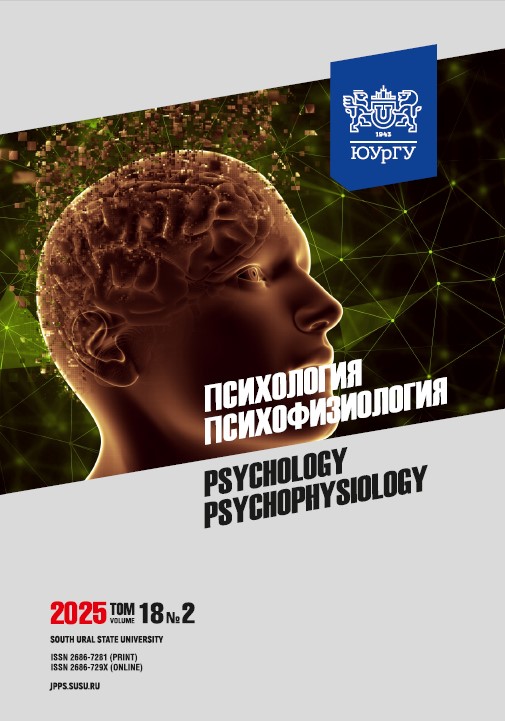Intellectual types of student resilience
Abstract
Introduction. Modern students encounter a multitude of life situations that require resolution. Resilience, as a global psychological resource, enables individuals to successfully address life challenges. However, not all determinants of resilience have been sufficiently studied. Among these are intellectual characteristics, which may manifest in different ways. Aims. This paper aims to develop an intellectual typology of student resilience. Materials and methods. The study employs the following psychodiagnostic tools: Raven’s progressive matrices, the Torrance tests of creative thinking (adapted by A. Voronin), the creativity assessment packet (adapted by E. Tunik), the social skills inventory (adapted by E. Mikhailova), the EmIn questionnaire (D. Lyusin), the human resilience test (E. Rylskaya), the metacognitive awareness inventory (adapted by E. Perikova and V. Byzova), and the rational experiential inventory (adapted by T. Kornilova and A. Razvaliayeva). Data processing was conducted using cluster analysis via IBM SPSS Statistics 30. The study sample consisted of 1st- to 5th-year students from Ural State Medical University and Russian State Vocational Pedagogical University (М = 228, = 19.92, sd = 2.44). Results. Three intellectual types of resilience were identified with a focus on the model of resolving life challenges: 1. diligent-unstable (resolving life challenges through time investment, potentially with creativity; key feature – persistence); 2. maladaptive-unstable (difficulties in social and self-interaction; key feature – reliance on existing experience); and 3. experientially-stable (spontaneous resolution of life situations, successful social adaptation, self-awareness; key feature – adaptability). Conclusion. These findings may facilitate university psychological services, individual counselling, and the academic training of psychologists
Downloads
References
2. Rylskaya E.A. Test “Human System Capability”: Working Out and Psychometrical Characteristics. Socium i vlast = Society and power. 2016;1(57):20–30. (in Russ).
3. Rylskaya E.A. Types of human vitality. Vestnik Yuzhno-Uralskogo gosudarstvennogo universiteta. Seriya: Psikhologiya = Bulletin of the South Ural State University. Series: Psychology. 2009;30(163):24–30. (in Russ).
4. Liu H., Boyatzis R.E. Focusing on Resilience and Renewal From Stress: The Role of Emotional and Social Intelligence Competencies. Frontiers in Psychology. 2021;12:685829. DOI: 10.3389/fpsyg.2021.685829
5. Kokcam B., Arslan C., Tras Z. Do Psychological Resilience and Emotional Intelligence Vary Among Stress Profiles in University Students? A Latent Profile Analysis. Frontiers in Psychology. 2021;12:788506. DOI: 10.3389/fpsyg.2021.788506
6. Jurado M.M.d.M., Martínez Á.M., Martín A.B.B. et al. Emotional Intelligence Profiles and Mobbing in Nursing: The Mediating Role of Social Support and Sensitivity to Anxiety. European Journal of Investigation in Health, Psychology and Education. 2021;11(2):345–357. DOI: 10.3390/ejihpe11020026
7. Lyusin D.V. Sovremennye predstavleniya ob emotsionalnom intellekte [Modern concepts of emotional intelligence]. Sotsialniy intellekt: teoriya, izmereniye, issledovaniye [Social intelligence: Theory, measurement, research]. Eds. Lyusin D.V., Ushakov D.V. Moscow. Institute of Psychology RAS Publ. 2004:29–36. (in Russ).
8. Perikova E.I., Byzova V.M. Factor Structure of the Russian Version of the “Metacognitive Awareness Inventory”. Kulturno-istoricheskaya psikhologiya = Cultural-Historical Psychology. 2022;18(2)116–126. DOI: 10.17759/chp.2022180213. (In Russ).
9. Tunik E.E. Luchiye testy na kreativnost. Diagnostika tvorcheskogo myshleniya [The best tests of creativity. Diagnosis of creative thinking]. Saint Petersburg. Piter Publ. 2013:320. (in Russ).
10. Kornilova T.V., Razvaliaeva A.U. The Rationality and Intuition Scales in S. Epsteins Questionnaire REI (Russian Approbation of the Full Version). Psikhologicheskii zhurnal = Psychological Journal. 2017;3(38):92–107. (in Russ). DOI: 10.7868/S0205959217030084.
11. Afek A., Ben-Avraham R., Davidov A. et al. Psychological Resilience, Mental Health, and Inhibitory Control Among Youth and Young Adults Under Stress. Frontiers in Psychiatry. 2020;11:608588. DOI:10.3389/fpsyt.2020.608588
12. Kartol A., Üztemur S., Griffiths M.D. et al. Exploring the interplay of emotional intelligence, psychological resilience, perceived stress, and life satisfaction: A cross-sectional study in the Turkish context. BMC Psychology. 2024;362:362. DOI: 10.1186/s40359-024-01860-0
13. Sarrionandia A., Ramoz-Diaz E., Fernandez-Lasarte O. Resilience as a Mediator of Emotional Intelligence and Perceived Stress: A Cross-Country Study. Frontiers in Psychology. 2018;9:2653. DOI:10.3389/fpsyg.2018.02653
14. Valverde-Jane M., Ortega-Caballero M., Ortega-Caballero I. et al. Study of Factors Associated with the Development of Emotional Intelligence and Resilience in University Students. Education Sciences. 2023;13(3):255. DOI: 10.3390/educsci13030255
15. Wigtil C.J., Henriques G.R. The Relationship Between Intelligence and Psychological Well-Being in Incoming College Students. Psychology of Well-Being: Theory, Research and Practice. 2015;5:4. DOI: 10.1186/s13612-015-0029-8
16. Denovan A., Dagnall N., Drinkwater K. Examining what Mental Toughness, Ego Resiliency, Self-efficacy, and Grit measure: An exploratory structural equation modelling bifactor approach. Current Psychology. 2022;42:22148–22163. DOI: 10.1007/s12144-022-03314-5
References on translit
-Copyright (c) 2025 Psychology. Psychophysiology

This work is licensed under a Creative Commons Attribution-NonCommercial-NoDerivatives 4.0 International License.



